You’re joining me in-progress on the Circle Farm Tour, a self-guided agricultural odyssey in BC’s Fraser Valley. Click here to read about the first part of my day.
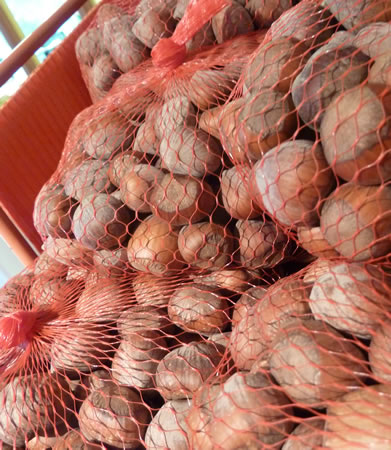 My Circle Farm Tour continued down the road to the Canadian Hazelnut outpost, a 60 acre family-run orchard where the delectable nuts were starting to grow and form on the trees. As a steady drizzle came up ducked into the little storefront, tucked among the processing buildings which contained specially hand-crafted machinery for handling these precious proteins.
My Circle Farm Tour continued down the road to the Canadian Hazelnut outpost, a 60 acre family-run orchard where the delectable nuts were starting to grow and form on the trees. As a steady drizzle came up ducked into the little storefront, tucked among the processing buildings which contained specially hand-crafted machinery for handling these precious proteins.
The orchard was established in 1981 by a local man named Henry Wigand with an eye to establish hazelnuts in the region. He and his son fashioned much of the specialized equipment needed for processing, but he passed away just before completing his vision. Another local family, the Hanninens, bought the farm and saw it to completion. They’ve expanded it and now run the thriving farm together.
These delicious nuts, I learned, are versatile as well. A sample of a hazelnut spread melted in my mouth as I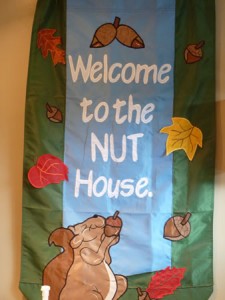 peered at the display of hazelnuts on parade: coated with honey and maple, candied to be savory and spicy, and even made into ice cream. On the surrounding shelves and coolers, vegan hazelnut burgers, cold-pressed oils, fresh pesto and even hazelnut flour were on offer. Stacks of fresh hazelnuts in the shell boasted a 4 year shelf life.
peered at the display of hazelnuts on parade: coated with honey and maple, candied to be savory and spicy, and even made into ice cream. On the surrounding shelves and coolers, vegan hazelnut burgers, cold-pressed oils, fresh pesto and even hazelnut flour were on offer. Stacks of fresh hazelnuts in the shell boasted a 4 year shelf life.
Even better, all the hazelnuts grown here are 100% certified organic. The Hanninen’s also share a wealth of health info about hazelnuts with their visitors. High in protein and low in saturated fats, they are showing others the myriad ways you can work the wonderful hazelnut into your diet.
Continuing towards Chilliwack, we arrived at Chilliwack River Valley Natural Honey as the sun coaxed the clouds to lift. The owners, Richard and Shirley Pye, greeted us and offered to introduce us to the bees. Keeping a safe 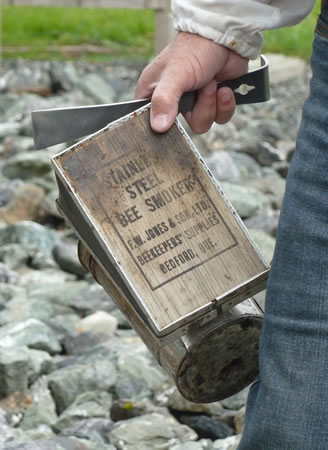 distance, the smell of smoke mingled with the fresh rain on the trees as Richard used his smoker to mellow out the bees.
distance, the smell of smoke mingled with the fresh rain on the trees as Richard used his smoker to mellow out the bees.
Pulling out a honeycomb covered in slow-moving smoked out bees, Richard explained that each colony has one queen bee, about 4,000 worker bees and 2,000 drones. The worker bees are females and the drones, all males, are there just for reproducing. The queen stays in the colony all of her life, which can be about 5 – 7 years.
Richard, who got his masters degree in beekeeping at Simon Fraser, says he got started in the craft late in life but has found something he truly enjoys. This was evident when he described days spent out in the berry patches and flower fields that he brings the colonies too so that they can produce varied flavors of honey. They also “rent out” the bees to local farmers for pollination; a visit by one of his colonies can double the local blueberry harvest. He encourages me to hold one of the honeycomb frames to feel its weight (surprisingly heavy) and then to sink my finger in the soft wax and taste the oozing fresh honey. It’s like drinking water from the source – slightly warm, golden sweet, unforgettable.
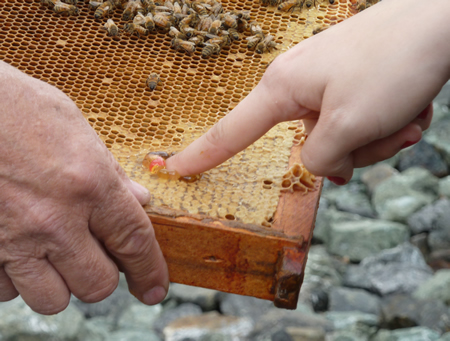
Inside their sweet country store, Shirley is queen bee. The smell of warm honey and beeswax softens the sugar 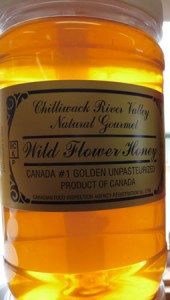 high of tasting the many flavors of honey on offer: blueberry, thistle, fireweed, maple, wildflower and more. It’s all-natural and completely mixed by hand, not machine. They also sell bags of bee pollen, which can be taken daily as a health supplement.
high of tasting the many flavors of honey on offer: blueberry, thistle, fireweed, maple, wildflower and more. It’s all-natural and completely mixed by hand, not machine. They also sell bags of bee pollen, which can be taken daily as a health supplement.
An upper shelf lines the store filled with vintage honey tins, and Richard points out a particularly banged-up one to me. He explains that The Amazing Race came through, and this unassuming tin held the clue that teams had to find in the store. It doesn’t look like much, but it’s the only one made for honey confections, he says with a devilish grin.
He and Shirley are still grinning as they wave goodbye to us from driveway and we continue down the road. It feels like we’ve been chatting with neighbors on a Sunday afternoon.
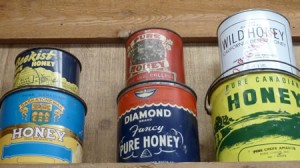
Wrap up the Circle Farm Tour with me on my next post – stay tuned!